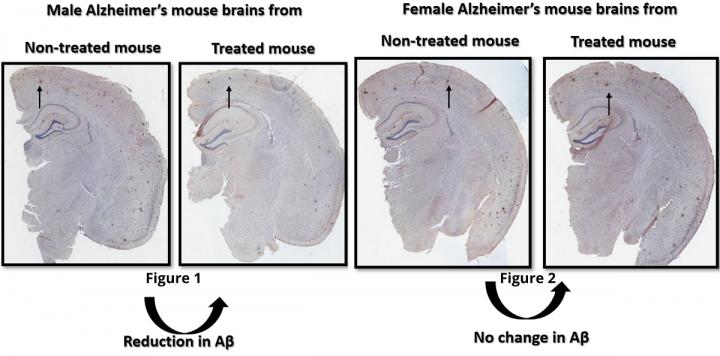University of Ottawa research in mice highlights sex-specific difference that could prevent certain treatments from working in females, signaling caution with design of drug trials in the future

Credit: University of Ottawa
A University of Ottawa study has found a specific Alzheimer’s treatment is effective in male and not female mice, providing a window into the biology of the disease and the effectiveness of targeted treatments.
The paper, ‘AB oligomers induce pathophysiological mGluR5 signaling in Alzheimer’s disease model mice in a sex-selective manner’, published in Science Signaling Magazine highlights the mechanisms underlying Alzheimer’s disease are fundamentally different between men and women in regards to one specific treatment.
The study was led by first author Dr. Khaled Abdelrahman alongside senior author Dr. Stephen Ferguson, both of the Faculty of Medicine’s Department of Cellular and Molecular Medicine and the Brain and Mind Research Institute.
Dr. Abdelrahman shared some insights into the findings.
What exactly did you set to study?
“The research involved assessing the memory function in female and male Alzheimer’s mice after they were treated with a drug that selectively blocks a receptor to regulate memory and learning. We then assessed the recovery of memory deficits after treatment and how it is different between sexes. We also examined whether the binding of a toxic Ab; peptide to this receptor is different between male and female mouse and human brain.” (Note: An AB peptide is found in the brain of an Alzheimer’s patient and is a hallmark of the disease.)
What did you find?
“We showed at least one promising Alzheimer’s disease treatment was effective in reversing the disease in male mice but that it was unable to do so in female mice. This will have important implications for future drug discovery and clinical trials design for Alzheimer’s disease.”
How do these findings translate to humans?
“We utilized post-mortem brain tissue from male and female human donors to corroborate our findings. The benefit to humans is that these selective differences may be applicable to many drugs in the market or in clinical trial phases.”
What kind of impact can this discovery have?
“We have to be careful when designing clinical trials in the future since many drug candidates have the opposite or different outcomes for both sexes; not all drugs that work for men will work with women, and vice-versa. It also changes how clinical trial data should be evaluated and segregated by sex. Importantly, it defines a previously unknown differences in the biophysical properties of an important receptor in the brain that regulates memory and learning.”
What was your reaction to these findings?
“As a pharmacist, I have witnessed many patients in practice who struggle with Alzheimer’s disease and ineffective treatments. This motivated me to make effort in understanding the mechanisms that lead to the disease for better therapeutic approaches to be undertaken.”
###
Media Contact
Paul Logothetis
[email protected]
Original Source
https:/
Related Journal Article
http://dx.




